
Perry's Saints
or
The Fighting Parson's Regiment
• Title
• Author
• Preface
• Chapter I
• Chapter II
• Chapter III
• Chapter IV
• Chapter V
• Chapter VI
• Chapter VII
• Chapter VIII
• Chapter IX
• Chapter X
• Chapter XI
• Chapter XII
• Chapter XIII
• Chapter XIV
• Chapter XV
• Chapter XVI
• Chapter XVII
• Chapter XVIII
• Chapter XIX
• Chapter XX
PERRY'S SAINTS.
CHAPTER XVIII.
Discharge of old members of the regiment. Attack at Chapin's Farm. Partial success. Condition of the South. New recruits. In winter-quarters. Thanksgiving Day. Resignation of Colonel Barton. His long and faithful service. Tenth and Eighteenth corps united. Expedition against Fort Fisher. Second expedition against Fort Fisher. Gallant charge and capture of the fort. An important event. Other successes. March to Wilmington. Pursuit of the Confederates. Their surrender of Union prisoners. Their condition. On the march to join Sherman's army. Sherman's grand march to the sea-coast, and its results. Grant's operations ending in surrender of Lee and his army. With Sherman's army on the march for Johnston. Announcement of surrender of General Lee. Continued pursuit of Johnston. Lincoln's assassination. Its effect on the army. Surrender of Johnston.[October 1864]
SEPTEMBER 17, the old members of the regiment who had not re-enlisted were honorably discharged, and started homewards. On the 28th, the 10th and 18th corps left the intrenchments at Petersburg, and, crossing the Appomattox, marched to the James River. The 10th corps, under General Birney, was to attack the enemy at Deep Bottom, while to the 18th corps, under General Ord, was assigned the duty of taking the Confederate works at Chapin's Farm. The 10th corps made an assault early on the morning of the 29th, and were completely successful; but the 18th corps, after gallantly carrying the outer works at Chapin's Farm, and capturing fifteen pieces of artillery and many prisoners, found the second line of defence so formidable that more careful
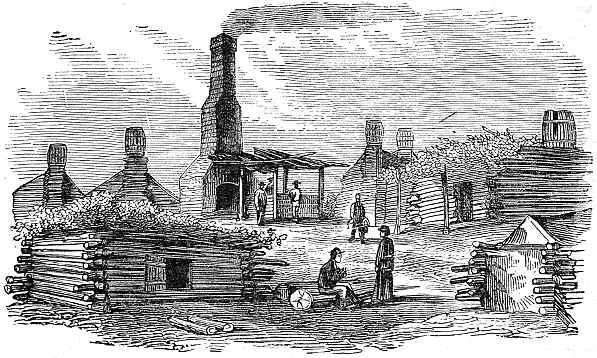
ARMY'S HUTS AT CHAPIN'S FARM.
preparations were necessary before attempting its capture. In the meantime, General Birney proceeded up the 'Newmarket road towards Richmond, apd established communication with the 18th corps. The delay which followed the first assault at Chapin's Farm, gave time for the enemy to call in re-enforcements, and the second assault proved unsuccessful. The fol- lowing day the enemy attempted to recover the portion of the works which they had lost, but were repulsed with considerable loss. In these engagements, the 48th lost a number of men, in killed, wounded, and prisoners.
October 7, a vigorous effort was made by the enemy to drive us out of our positions on the north side of the James, but, after a partial success, they were driven back. This proved the close of active operations for the year, as nothing further of importance took place ill this department. Our army was rapidly filling up from the recent conscription, while the South had already reached its last ditch. It had no reserve force to call upon, its resources were becoming exhausted, and its army reduced to exkemities.
About this time our regiment received some forty or more recruits, and for the week that followed, until December 7, it remained in the vicinity of Deep Bottom. Its routine of duties is indicated by a single day's record, taken from the journal of Townsend - date, November 8. "In the morning, at four o'clock, we were turned out and went inside the fort, and remained until seven o'clock, and were then dismissed. The weather being clear, after breakfast we were all ordered on fatigue; some building log huts, and the rest in the woods carrying logs. We worked all day, and at six o'clock in the afternoon were dismissed." On
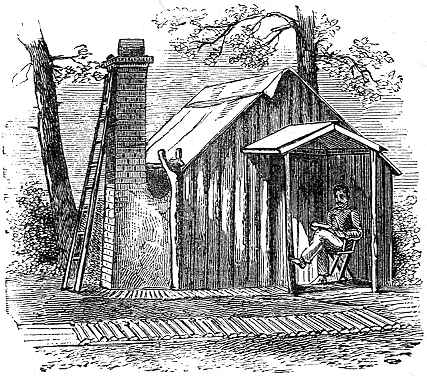
OFFICERS' QUARTERS, CHAPIN'S FARM.
the 15th, the huts were completed, tents were taken down, and the regiment went into winter-quarters.
The 24th was Thanksgiving Day, to be specially remembered by every soldier on account of the abundant supply of turkeys, apples, and other good things, furnished them by the people of the North, and distributed
[December, 1864]
through the agency of the two societies previously referred to. Through this period, squad, company, and battalion drills were kept up with as much regularity as relief from other duties permitted. The size of the regiment . may be inferred from the fact that five companies were usually united for a company drill.December 3, Colonel Barton, having reached the limit of his term of service, was mustered out at his own request. The inconvenience resulting from the wounds received at Fort Wagner and Cold Harbor, and his general condition of physical prostration, demanded a rest. He had proved an earnest, faithful, efficient, and intelligent officer, and the regiment, uilder his command, attained a proficiency in drill and a condition of general excellence that easily placed it at the head of the troops with which it was associated. Often detached on special important service, he filled every position with credit to himself and satisfaction to his superior officers. His relations with the commanding officers under whom we served in the several departments were
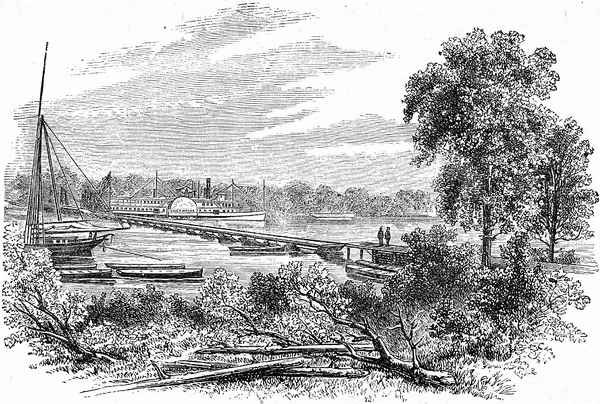
PONTOON BRIDGE AT JONES' LANDING, NEAR DEEP BOTTOM.
uniformly of an agreeable character, a circumstance from which the regiment profited to no inconsiderable extent. His brevet of brigadiergeneral was well earned, and he may well. regard the years of service which he gave to his country as entitling him to general respect and esteem. On the 5th of December, all the white troops of the 10th and 18th corps were consolidated and formed the 24th, and the colored troops from the same formed the 25th corps.
On the evening of the 6th, orders were received to pack up and be ready for a march, but the movement did not take place until the afternoon of the 7th, when the 2d division, to which our regiment was assigned, formed in line and started for Jones' Landing, near City Point, where they arrived on the morning of the 8th. Here they embarked on the steamer Perritt, and proceeded to Fortress Monroe, the point of rendezvous of the expedition. On the 13th they left Fortress Monroe, and for much of the time until the 30th were steaming up and down the coast. For several days they were at Beaufort, N. C., taking in supplies of coal and water, and from there proceeded to Cape Fear River, and landed near Fort Fisher, intending to make an assault; but General Wei-tzel, who had immediate command of the troops, declared it would be suicidal to make the attempt, and the men re-embarked, and the transports returned directly to City Point.
General Butler, who had charge of the land forces, concei ved the idea of sending in near to Fort Fisher a vessel loaded with powder, expecting that by its explosion the fort would be materially damaged. The plan was carried out, but no visible effect followed the explosion, and the expedition, which was based upon the success of the plan, proved a failure. From City Point the regiment returned to its old position at Chapin's Farm. The men had suffered from their long confinement on the dirty steamer. The food was insufficient and the vermin intolerable, and it was a blessed relief to get back where they could cleanse and purify themselves and clothing.
From December 30 to January 3 they were allowed to remain in camp, enjoying quiet and rest. On that day everything was packed and made ready for a change, in obedience to orders, and on the evening of the 3d they started for Bermuda Hundred. On the 4th, they embarked on the steamer Tonawanda, and the next day were at Fortress Monroe. On the 8th they were in Hatteras Inlet. On the Dth, they joined the fleet off Beaufort, N. C. Oil the 12th, they were in Cape Fear River, and on the 13th moved farther in, and nearer Fort Fisher.
A change had been made. General Butler had been relieved on his return from the former expedition, and General A. H. Terry was now in command of the troops, while Admiral Porter commanded the naval forces, as before. At ten o'clock on the morning of the 13th, a landing was effected in small boats, and the troops formed on the beach and stacked arms, and proceeded to throw up intrenchments from Cape Fear River to the beach. During the 13th and 14th, a heavy bombardment was kept up on Fort Fisher by the navy, and on the 15th our division, whicb bad been working round to the rear of the fort, prepared for an assault.
[January, 1865]
Having left behind knapsacks and all other encumbrances, about two o'clock in the afternoon the first charge was made, which resulted in securing the outer section of the fort. At the same time, the naval brigade charged in front. Charge succeeded charge, until ten o'clock in the evel,ling, when the garrison, having been driven into our bastion, surrendered. The fighting on both sides was very stubborn. From the description of the fort, which I gather from those present at the assault, it was composed of detached mounds. When one was taken, our men gathered behind it for a short halt and rest. And then, with a sudden rush and bound over and around this mound, another was taken, until at last the whole was captured, with twenty-five hundred prisoners and sixty guns. Our losses were quite severe. Captain Dunn, my old orderly sergeant, who behaved so well at Chester Heights, was killed; and many names in our regiment, as well as in the others engaged, were added to the long list of martyrs. Everything had been arranged to blow up the fort, rather than surrender it; but the wires connecting tte batteries which were

INTERIOR OF FORT FISHER.
arranged to effect the explosion were cut off from their connections with the magazines by the shot and shell from the navy. A slight explosion did take place, late at night, after our regiment had been withdrawn. Several other small forts in the vicinity were blown up by the Confederates, but the garrison of Fort Anderson, some little distance up the river, remained in possession until February 19, when the disposition of our troops was such that there could no longer be any hope of being able to hold it, and it was evacuated.
During the interval, our forces had been strengthened, by the arrival of the 23d army corps, under General Schofield, and
[February, 1865]
many new recruits had arrived from the North, our regiment receiving on the 7th of February two hundred and ten.The capture of Fort Fisher was an important event. By it one of the worst points on the southern coast was shut up, for, in spite of the utmost vigilance on the part of our navy, immense quantities of supplies had been brought in, through the several entrances of Cape Fear River, by blockade-runners. But a much more important service was rendered to our cause by its capture than in cutting off supplies. For at this time General Sherman, having completed the wonderful march from Atlanta to the sea-coast at Savannah, had now turned northward, and was on his way to co-operate with the Army of Virginia, in that final struggle which ended the rebellion; and the capture of Fort Fishel', and the other defences on Cape Fear River gave a new basis of supplies and military operations, which materially aided Sherman.
General Terry, having succeeded in capturing these forts, disposed his forces, which consisted of about eight thousand men, in such a manner
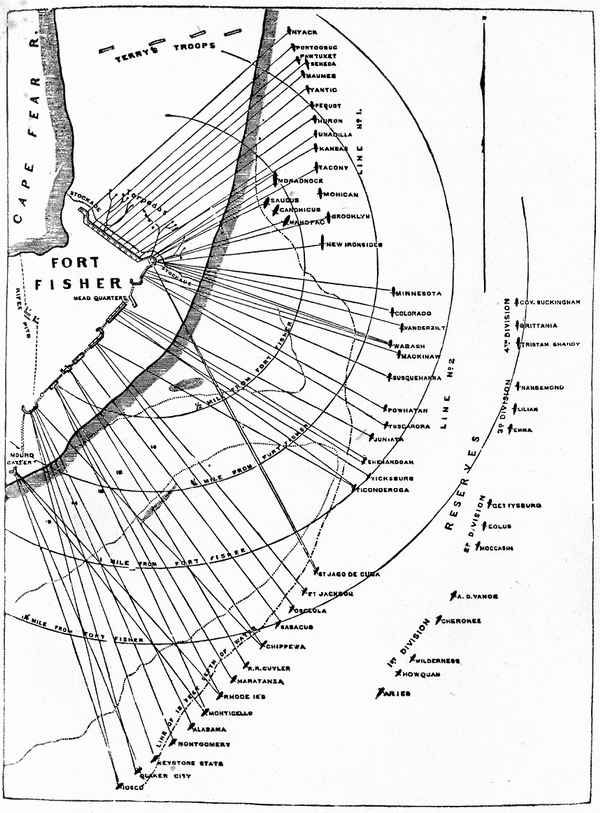
PLAN OF LAND AND NAVAL OPERATIONS AT FORT SUMTER.
as to be secure from attacks, and awaited the actIon of General Schofield, who had been assigned the command of the new department of North Carolina. No time was wasted. New and more favorable positions were taken from time to time, and on the 20th a general movement was made towards Willmington.
On the 21st, our regiment, which, with the other troops under General Terry, was advancing towards this city on the east side of the river, suddenly came upon a strong force of the Confederates, who opened a heavy fire, by which two men were killed, and Major Elfwing and seventeen others wounded. The enemy were driven within their works and held there, until a division under General Cox, by threatening to cross the river above the city, compelled a general retreat, which was effected after the burning of the steamers at the wharves, and the destruction of the military stores and cotton in and n ear the city.
On the 22d, Washington's birthday, Wilmington was occupied by our troops, an'd perhaps no result of this occupation was of as much interest to the soldiers as the fact that by it they secured a supply of tobacco, of which they had been deprived for several weeks. In the recent operations, the loss to the Federal side was about two hundred in killed, wounded, and missing; and the Confederate loss, about a thousand, in killed and wounded, while a large number of prisoners, with thirty pieces of cannon, and an immense quantity of ammunition, had fallen into our hands.
General Schofield's next movement was against Goldsboro, to open a communication with General Sherman; and a large force was sent to Kingston, to secure and repair the railroad. These troops advanced by way of Newbern. Our division was allowed no rest, but on the afternoon of the 22d started in pursuit of the retreating enemy. So sharply was this kept up that on the 27th a flag of truce was proposed by the Confederate commander, for the purpose of transferring the Union prisoners, so much did they encumber his movements. Accordingly, we received into our lines nearly ten thousand, officers and privates, some of whom had been captured from our regiment at
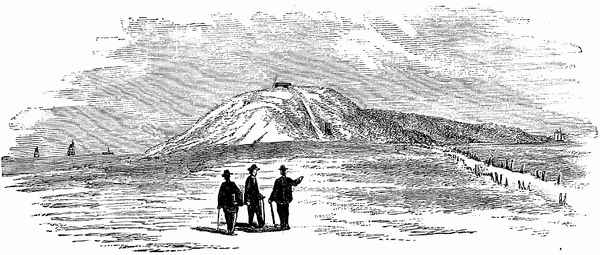
MOUND BATTERY, NEAR FORT FISHER.
Olustee and Cold Harbor. All were in the most deplorable condition, ha1f clothed and almost wholly starved. These were conveyed to Wilmington, to which city our regiment reo turned March 2.
New recruits arrived from time to time, and were instructed in their duties, alid, with the exception of one short expedition to guard wagon-trains, the regiment remained near Wilmington until the 15th.
March 12, General Sherman, who had arrived at Fayetteville, sent despatches to General Schofield, directing him to march at once to Goldsboro, and to order General Terry to do the same. Accordingly, on the 15th they broke camp, and started to join Sherman. That night, before they lay down, they had marched twenty-five miles. The following day the march was resumed, and, although the roads were very heavy, they moved rapidly, and day after day continued on, with no special accident, or incident, until the 21st, when signs of Sherman's bummers began to appear, and in the afternoon there was heavy cannonading on our left.
[March, 1865]
At this time, and for some time previous, our troops had subsisted largely by foraging. Sugar and coffee were almost forgotten luxuries.On the the 23d, the 17th corps of Sherman's army passed near our troops, and the motley procession which accompanied them showed how successful they had become as foragers. Goldsboro had been taken by General Schofield's troops on the 21st, and Johnston had massed his army at Smithfield. General Sherman had now a large force under his command, and, with several good safe bases of supplies, and uninterrupted communication with the coast, was prepared to perform his part in these final struggles of the rebellion. His march from Savannah had resulted in the loss to the Confederates of all the fortified points along the coast, with the immense quantities of supplies ,and materials of war which they COI1tained. A tract of fifty miles in width, along his whole route, had been stripped of all kinds of provisions, and the richest ,portion of the South had been devastated. The great system of internal comdlunication and supply, which had afforded them such great advantages in the movements of their armies, was either destroyed or fatally disarranged.
By this time General Grant was ready for that final movement against Lee which resulted in the surrender of his army. This movement commenced on the 29th, and, after repeated attempts upon the enemy's right, a general assault, along the whole line, on April 2, resulted in complete success, and on the moming of the 3d it was' discovered that Lee's army had fled, and on that day our troops, under General Weitzel, occupied Richmond. The principal part of Grant's army passed on after Lee. Sheridan, with his whole force of cavalry, by rapid marches, finally succceded, on the 9th, in intercepting Lee's retreat, and, by a vigorous attack, held him in check until the arrival of several corps of infantry made escape impossible; and on that day Lee, and what remained of his army, fell into our hands. The principal army now remaining to the Confederates was that commanded by Johnston.
General Sherman, while these operations were going on, was resting at Goldsboro; but
[April, 1865]
on the 11th orders came from General Grant to move against Johnston. As late as March 28, new recruits were received from the North, nearly a hundred and fifty being assigned to our regiment; and when, on the 11th, General Sherman broke camp and started for Johnston, it was with an army invigorated, strengthened, and refreshed, and stimulated to unbounded enthusiasm by the success of the Army of Virginia. April 6, general orders had been promulgated to all the troops at their evening parades, stating that Petersburg and Richmond had been taken, and that Lee was retreating.April 7, another despatch was read, announcing that General Sheridan had captured twelve thousand prisoners and fifty pieces dr artillery. On the 10th, two divisions of the 10th corps, which had again been reunited under General Terry, started on the march towards Raleigh. On the 11th, the march was continued rapidly, our brigade being in the advance. Frequent halts were necessary, on account of the destruction of the bridges by Johnston's army. On the 12th, while resting and waiting for a"wagon-train, for which they were to be escort, a despatch was read from General Schofield announcing the surrender of General Lee. This had been known by other portions of the army, which had passed
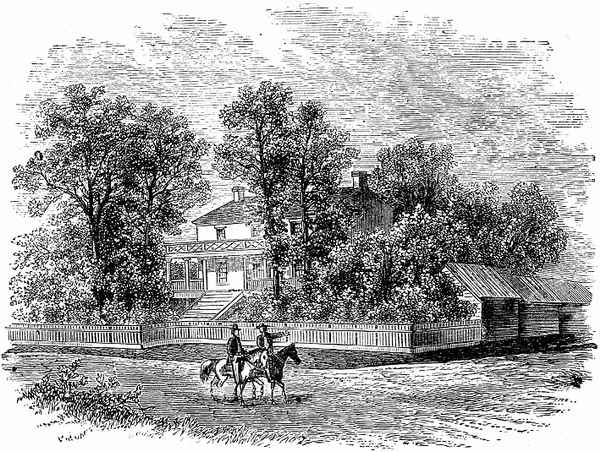
M'LEAN'S HOUSE, THE PLACE OF LEE'S SURRENDER.
on from other points, and had already driven Johnston's army out of Smithfield.
The forward movement was resumed by our brigade on the afternoon of the 12th, but the roads continued very heavy, and the men were often compelled to wade through swamps, and at night slept on the ground with scarcely more than the sky for a covering. On the evening of the 14th, they arrived in the vicinity of Raleigh, and established camp a short distance outside the city. The Confederate army had made no stop here, and General Sherman con- tinued the pursuit some twenty or twenty-five miles, to a point called Durham Station, when, the hopelessness of further resistance being apparent, a request was sent to General Sherman by Johnston, asking for a truce, with a view to arranging the terms of surrender. of his army. This occurred on the 15th, and as the fact became generally known on the 16th, that night was given up to rejoicing, for it was felt that the war was now over. This, however, proved premature, for the terms proposed, and which were evidently dictated by Davis and other leaders of the rebellion, who were known to be in the vicinity, although accepted by General Sherman, when submitted to the authorities at Washington, were unhesitatingly repudiated as dealing with questions which were beyond the province of military commandel's; and order. were issued to resume operations at once. General Grant was despatched to Raleigh, where he arrived on the 24th, and notice was sent to Johnston demanding an immediate surrender, on the same terms given to General Lee. The troops were
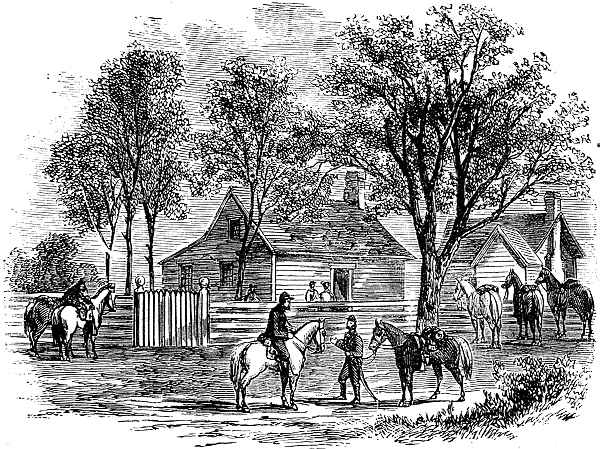
PLACE OF JOHNSTON'S SURRENDER TO SHERMAN.
| put in motion, and preparations were made to reopen the campaign; and it is safe to say that no order was ever issued to our troops which was received with such universal satisfaction as that to prepare to march against Johnston. News had been received of the assassination of President Lincoln, and, had our troops encountered Johnston's army, no quarter would have been given, so terribly were they exasperated. But, fortunately for Johnston and those under him, wise counsels prevailed in his camp, and on the 26th his whole army was surrendered, and the war was virtually over. |